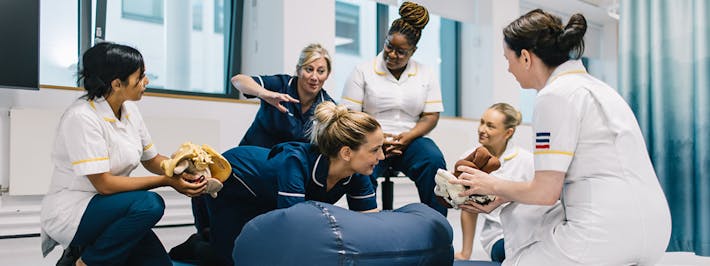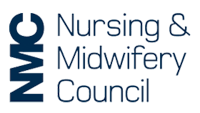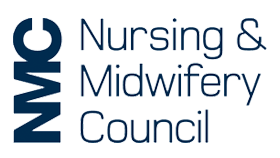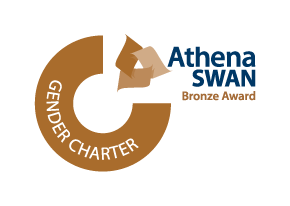
Midwifery - BSc (Hons)
Currently viewing course to start in 2024/25 Entry. Switch to 2025/26 Entry
Offering you the satisfaction of a career caring for the health of the mother, baby and her family, our midwifery course aims to prepare you to become a confident and compassionate midwife....
- Level Undergraduate
- Study mode Full Time
- Location City South
- Award BSc (Hons)
- Start date September 2024
- Fees View course fees
- School School of Nursing and Midwifery
- Faculty Faculty of Health, Education and Life Sciences
This course is:
Overview
Offering you the satisfaction of a career caring for the health of the mother, baby and her family, our midwifery course aims to prepare you to become a confident and compassionate midwife.
By successfully completing this course you will have the opportunity to graduate with two qualifications: the NHS Newborn and Infant Physical Examination Programme (NIPE) and a BSc (Hons) degree which is accredited by the Nursing and Midwifery Council (NMC).
What's covered in this course?
During the first two years, you will receive integrated theory and practice content. This will allow you to engage teaching and learning activities in both the academic and practice setting. The third year consists of alternate theory and practice blocks. You will study various modules, which will allow you to develop the skills, knowledge and behaviours required to care for women, and newborn infants across the care continuum from pre-pregnancy, pregnancy, labour and birth, postpartum, and the early weeks of a newborn infants’ life. Each year, you will engage in a yearlong practice module. This module, alongside varied clinical placements, will provide you with preparation and support to develop your confidence and competence in practice, working towards autonomously leading and co-ordinating care at the end of your course. Clinical practice will be assessed using the nationally, NMC approved Midwifery Ongoing Record of Achievement (MORA).
We work with our practice partners to ensure you will have practice learning experiences in a wide range of settings - including community, hospital or home settings. You will be exposed to diverse populations and you will learn to work as part of the interdisciplinary and multiagency teams. Whilst on placement you will be supported, supervised and assessed by suitably prepared practice and academic staff to develop your knowledge and skills. There will also be opportunities for exposure to alternative (including global midwifery) experiences during the elective placement.
The Midwifery Department is committed to providing you with excellent, innovative, learning, teaching and assessment experiences. We use technology to enhance your learning, through lectures, seminars, skills, simulation and virtual learning. Engagement of practice partners and service users in all areas of learning, teaching and assessment is integral to our approach. Our evidence-based curriculum will empower you to contribute to the provision of high-quality holistic care both during your studies and in your future profession.
Accredited By
The Nursing and Midwifery Council (NMC) works with partner organisations to set and maintain high standards of nursing and midwifery education across the UK.
This course has been approved and monitored by the NMC to make sure that the education and training on offer meets their standards.
To work as a nurse or midwife, you must pass an NMC approved course at a higher education institution (HEI) in pre-registration nursing and midwifery, leading to registration with the NMC.
Why Choose Us?
- Funding - students in receipt of a student loan will receive at least £5,000 a year in additional funding for maintenance and associated study costs. Download the funding FAQs.
- This course has been redeveloped in line with the latest midwifery education standards and is approved by the NMC.
- Birmingham is one of the UK’s most diverse cities outside of London, which provides you with a wide variety of placement experiences that will be valuable to take forward into your future career.
- Our specialist skills facilities include a purpose-built midwifery teaching suite complete with birthing pool, and various high tech teaching tools, such as our Sim Mum birth simulator and realistic neonatal mannequins to help simulate a variety of midwifery scenarios as you learn.
- Finish your course with two qualifications: By successfully completing this course you will have the opportunity to graduate with two qualifications: BSc in Midwifery which is accredited by the Nursing and Midwifery Council (NMC) and the Public Health England Newborn and Infant Physical Examination Programme (NIPE).
- Student loan finance - If you’ve already studied an undergraduate degree but would like to do a second one in Midwifery? You may be eligible for funding.
Open Days
Join us for an on-campus Open Day where you'll be able to meet us in person. Booking for the next event isn’t open yet. Register your interest below and we’ll email you as soon as booking goes live.
Next Open Day: 29 June 2024
Entry Requirements
These entry requirements apply for entry in 2024/25.
All required qualifications/grades must have been achieved and evidenced at the earliest opportunity after accepting an offer to help confirm admission and allow for on-time enrolment. This can also include other requirements, like a fee status form and relevant documents. Applicants can track their application and outstanding information requests through their BCU mySRS account.
Essential requirements
128 UCAS tariff points
Please note: If you qualify for our BCU Accelerate scheme, you could receive an offer that is two grades below our normal entry requirements. Find out more about BCU Accelerate.
Applicants will also need to complete an interview for this course; see interview arrangements below.
If you have a qualification that is not listed, please contact us.
Fees & How to Apply
UK students
Annual and modular tuition fees shown are applicable to the first year of study. The University reserves the right to increase fees for subsequent years of study in line with increases in inflation (capped at 5%) or to reflect changes in Government funding policies or changes agreed by Parliament. View fees for continuing students.
Award: BSc (Hons)
Starting: Sep 2024
- Mode
- Duration
- Fees
- Full Time
- 3 years
- £9,250 in 2024/25
- Apply via UCAS
International students
Sorry, this course is not available to International students.
Funding
From August 2020, nursing professional degree students will receive at least £5,000 a year in funding support.
Personal statement
Your personal statement is a highly important part of your application. It gives you a crucial opportunity to say why you’re applying and why the institution should accept you.
Here are the key areas you’ll need to address:
Course choice
Why does this course appeal? What areas are of particular interest?
Career plans
If you have a specific career in mind, say how your chosen course will help you pursue this goal.
Work experience
Mention any work that is relevant to your subject, highlighting the skills and experience gained.
School or college experience
Highlight skills gained at school/college, eg summer schools or mentoring activities.
Non-accredited skills or achievement
eg Duke of Edinburgh Award, Young Enterprise scheme.
You should also mention your future plans – if you’re planning to take a year out, don't forget to give your reasons. Talk about any subjects you’re studying that don’t have a formal assessment and any sponsorships or placements you’ve applied for. And don't be scared to add in details about your social, sports or leisure interests.
Get more information on writing personal statements.
Course in Depth
Year One
In order to complete this course a student must successfully complete all the following CORE modules (totalling 120 credits).
This module will introduce you to the midwifery profession and the essential skills that will facilitate for successful studies throughout your course. It will introduce you to the skills and knowledge that you will require to transition into University studies and professional midwifery practice through personal self-development and reflection. The module will also enable you to explore support mechanisms to enhance your transition to Higher Education and begin to develop resilience for working within the midwifery profession.
This module focusses on the key principles of normal midwifery care during the antenatal period. It will provide you with the requisite knowledge and understanding of the midwife’s role in order to provide holistic care to healthy women, their families and the fetus.
You will be introduced to the relevant anatomy and physiology, whilst also exploring the sociological and psychological adaptations that women may encounter antenatally. In addition, you will be supported to apply evidence-based theory to your clinical practice, enabling you to develop your confidence throughout your first year.
This module focusses on the key principles of normal midwifery care during the intrapartum period. It will provide you with the requisite knowledge and understanding of the midwife’s role in order to provide holistic care to healthy women, their families and the fetus. This will include the understanding of normal processes and recognition of deviations from these, on all aspects of health and well-being for the woman and fetus during labour and immediately following birth and enable you to develop confidence throughout your first year.
The module aligns to the course philosophy, aiming to equip you to become midwives who provide skilled, knowledgeable, respectful and compassionate care for women and their families, enabling you to practice safely at this level of study and work toward being effective and proficient student midwives.
This is based on a holistic model of care which is responsive to the individual needs of women, their families and the fetus within contemporary society.
This 20 credit module introduces you to the care and management of postnatal women, their newborn infants and their families and starts to prepare you as a student midwife to carry out holistic systematic postnatal and newborn examination. The postnatal care and management of both the mother and newborn infant are an important role of the midwife and helps facilitate the transition to parenting. The module facilitates you to promote normality, respect diversity, ensure equality, recognise deviation from normal and instigate appropriate actions. You will be introduced to concepts of working in partnership with the multi-professional team and promoting the mother and family interaction and care of the newborn infant. The module integrates relevant infant feeding policies and practices in line with the Baby Friendly Initiative and introduces you to concepts of infant nutrition and feeding.
This module provides you with an introduction to and ongoing support for practice elements of your course, as well as basic pharmacology and pharmacodynamics.
The module is designed to enable you to achieve clinical practice proficiencies through ongoing guided participation in the care of childbearing women and their families within the practice setting. The module offers year 1 preparation and development to grow your confidence and demonstrate the ability to participate, under direct supervision and direction, within the practice learning environment. You will be supported to continue to develop numeracy skills related to clinical practice and calculation of medicines, through safeMedicate® and our Academic Development Department.
Year Two
In order to complete this course a student must successfully complete all the following CORE modules (totalling 120 credits).
The Pre-registration NMC Educational Standards (2019) require the preparation of student midwives to be knowledgeable and skilled in making holistic risk assessments. Using a wide range of techniques, you will adapt midwifery care to individual needs and collaborate effectively with the multi-disciplinary team to keep women and babies safe. Midwives also need to signpost families to available local support resources to protect and promote their health and wellbeing and promote their establishment where necessary. This module will guide you to build on the foundation of the skills that you are developing in your other modules, but now with a focus on complex social and clinical needs.
This level 5, 20 credit module will enable you to continue to explore support mechanisms to enhance your transition and resilience for working within the National Health Service and Higher Education. This will equip you with knowledge and skills that will enable you to provide safe care and discover and debate contemporaneous and challenging issues that influence midwives and other healthcare professionals. You are the midwifery leaders of the future, who will be faced with challenges in order to change practice - the skills required to meet these challenges will be developed as part of this module.
The midwife has a role in caring for and supporting women and newborn infants requiring medical, obstetric and neonatal care.
This module introduces you to the principles of caring for women and their newborn infants with complex health conditions, which you will further build on within subsequent level 6 modules. You will be supported to develop the skills, knowledge and experience required to actively participate in the provision of complex midwifery care and work as part of the multi-disciplinary team.
The module provides you with the opportunity for further development and ongoing support for practice elements of your course. The module is designed to enable you to achieve clinical practice proficiencies through ongoing guided participation in care of childbearing women and their families within the practice setting. The module offers year 2 preparation, development and consolidation to continue to grow your confidence and be able to contribute to midwifery care within the practice learning environment, with decreasing supervision and direction.
You will be supported to continue to develop numeracy skills related to clinical practice and calculation of medicines, through safeMedicate® and our Academic Development Department.
Year Three
In order to complete this course a student must successfully complete all the following CORE modules (totalling 120 credits).
This module continues to prepare you to care for the women and newborn infant based on their individual needs. As well as caring for the woman in accordance with national guidelines, this module will also include the Newborn and Infant Physical Examination in accordance with Public Health England. This module enhances knowledge and skills in planning, leading and managing care, working with multidisciplinary teams and acting as an advocate for women, the newborn infant. The module prepares you to recognise, escalate and instigate immediate care for obstetric and neonatal emergencies.
To reach these levels of competence, students will be required to continue to develop an in-depth understanding of the physiology of pregnancy, birth, the mother and newborn. This module builds on knowledge gained from to previous modules at level 4 and 5.
This module introduces you to Public Health and Global perspectives. The module gives you the opportunity to examine Public Health within a global context, in order to compare and contrast wide-ranging health inequalities related to maternal and infant wellbeing, taking into account a life course approach. This module will facilitate the exploration of a midwife’s contribution to public health across the life course that impacts on pregnancy, childbirth, infancy and long-term health. It also provides an opportunity to evaluate the midwifery role within a global context and have a greater understanding of influences in health outcomes and care pathways within the local diverse, multi-ethnic population. This module can be studied as part of the BSc Hons in midwifery or as part of the MSci in Midwifery with Public Health.
This module provides you with the opportunity for further development and ongoing support for practice elements of your course. It is designed to enable you to achieve clinical practice proficiencies through ongoing participation in the care of childbearing women and their families within the practice setting. This will be through ongoing supervision and by practising independently with minimal supervision. The module offers year 3 preparation, development and consolidation to support confidence and be able to demonstrate proficiency within the practice learning environment, with minimal supervision.
You will be able to independently practice and develop your midwifery skills assisted by practice supervisors, practice assessors and academic assessors. You will participate in teaching and learning sessions that support your progress in practice and allow you to identify and reflect on your own learning needs and experiences in practice. You will complete your assessment for year three within the Midwifery Ongoing Record of Achievement (MORA) which will provide a record of your performance and achievements in the practice setting.
You will be supported to master your numeracy skills related to clinical practice and calculation of medicines, through safeMedicate® and our Academic Development Department.
In line with the NMC Education Standards (2019) the aim is to empower you throughout your career to promote and contribute to best midwifery evidence-based practice. You will undertake background study to identify a gap in the research and construct an argument for your chosen topic. You will undertake structured searches to identify and select best available evidence on your topic. You will learn in more detail about research methodology, consideration of research ethics, and will then be able to propose either primary or secondary research enquiry that seeks to address a gap in our knowledge base for midwifery practice.
Download course specification
Download nowIn our dynamic and innovative NMC validated course, we've taken major steps in responding to changes in the NHS that also map directly on to the very latest Nursing and Midwifery Council standards of best practice.
The course runs for 41 weeks each year. Approximately 50 per cent is devoted to theory and 50 per cent to clinical practice. When you are on clinical placement you are expected to participate in the care of child bearing women across the full range of shifts including night duty and weekends. Annual leave will be set for the year.
Additional support
If you are dyslexic, have a specific learning difference or a disability, we have a Disability Tutor who can help and support you with this.
More on our disability tutor >>
We offer extra technical and learning support.
This course is accredited by the following organisation:
The University is an Approved Education Institution. This course has been redeveloped in line with the new midwifery education standards and is approved by the NMC.
.

The Nursing and Midwifery Council
The Nursing and Midwifery Council (NMC) works with partner organisations to set and maintain high standards of nursing and midwifery education across the UK.
This course has been approved and monitored by the NMC to make sure that the education and training on offer meets their standards.
To work as a nurse or midwife, you must pass an NMC approved course at a higher education institution (HEI) in pre-registration nursing and midwifery, leading to registration with the NMC.

Athena Swan Bronze Award
We have successfully secured the Athena SWAN Departmental Bronze Award recognising a commitment to gender equality.
The Athena Swan Charter is a framework which is used across the globe to support and transform gender equality within higher education (HE) and research.
Employability
Enhancing your employability skills
Employers at our NHS partners consistently cite the strength of our graduates at interview and their suitability to be immediately fit for practice as a midwife.
We believe it is because of our selection of determined and caring individuals who are motivated to becoming midwives that have the 6C’s as their core attributes.
Placements
On the three-year Midwifery course, you can expect to enjoy a number of placements at some of the biggest and busiest NHS centres for midwifery training in the Midlands. We have a teaching-placement split of 40-60, reflecting the importance of the clinical experience you will get at these Trusts and birthing centres.
Within these placements you will experience a wide range of all midwifery practice progressing from normality in year one to complexity in year two which includes additional experiences such as gynaecology and more specialist roles in year three.
Our partner NHS Trusts are some of the world’s leading maternity environments, from Birmingham Women’s Hospital NHS Foundation Trust, Heart of England NHS Foundation Trust and Sandwell & West Birmingham Hospitals NHS Trust.
Facilities & Staff
Our Facilities
We are constantly investing in our estate and are currently in the process of spending £260 million on new learning facilities.
We boast up-to-date, innovative facilities that simulate the real situations that health professionals may come across.
These resources are essential in offering students a hands-on introduction to health and social care practice. Much of our teaching is carried out within our state-of-the-art, City South campus, which houses cutting-edge learning facilities.
Take a virtual tour of our skills suites at Seacole
In a sector where new techniques are constantly being discovered, we work hard to ensure that students learn using the most up-to-date equipment available. These include a mock operating theatre and a cutting-edge radiography virtual clinical training facility, virtual ward and virtual case creator.
Simulation Mannequins
We have several Simulation babies (SIM babies) which are leading edge, anatomically correct mannequins used for teaching specific techniques such as advanced paediatric life support skills, acute and high dependency clinical skills, first aid and communication skills.
The SIM baby mannequins are complete with software, which is used to replicate real symptoms, and are enhanced by the manipulation of for example blood pressure, pulse and heart rate for extra realism.
Skills Practice and Care Enhancement facility
The SPACE (Skills Practice And Care Enhancement) learning facility lets you further practice the skills taught in class, at your own pace and convenience.
It is fully stocked with the specialist items and equipment needed for procedures such as taking blood pressure, giving an injection, abdominal examination of a pregnant woman and caring for ill babies in an incubator.
Mary Seacole Library
The Seacole library, based at City South Campus, is one of the UK's largest specialist health education libraries. The state-of-the art facility offers an extensive range of information and reference materials set out in a relaxing environment, conducive to studying. There are comfortable seating areas, group study areas, a silent study area and private study rooms.
Computer Facilities
City South houses a large open access IT Suite which comprises of PCs, laptops, full colour printers, photocopiers and scanners. Our PCs all have:
- Fast (unrestricted) internet connectivity
- Ability to save files to USB, DVD & CD
- Microsoft Office software
- Research and statistical software
- Storage space which can be accessed from any PC across the University and from home
Our PCs are also designed to support students who may have difficulties with reading and writing, featuring specialised software with zooming/magnification and screen reading capabilities, which may also be customised for individual student needs.
Our staff
Julie Hadley
Deputy Head of Nursing and Midwifery
Julie is the Deputy Head of Nursing and Midwifery at Birmingham City University. She has been employed in higher education since 2008. After qualifying, she worked as a midwife at the Birmingham Women's Hospital and later as a Research Midwife. She was then employed as a project manager and research teacher and was involved in...
More about JulieNatasha Carr
Senior Midwifery Lecturer
A a senior lecturer in the Midwifery Department, Natasha is responsible for providing, supporting and facilitating teaching and learning on both the long and short BSc (Hons) Midwifery Programmes. In addition, Natasha teaches alongside colleagues on the Examination of the Newborn Programme and lead the Professional Midwifery Advocate (A-EQUIP)...
More about NatashaSamantha Meegan
Senior Lecturer in Midwifery
Samantha is a senior midwifery lecturer within the Department of Midwifery and Child Health. She leads modules for student midwives focusing on developing skills within obstetric and neonatal emergency situations, and exploring contemporary issues within midwifery. She teaches on a wide range of modules across both midwifery...
More about SamanthaLouise Hartin
Senior Lecturer in Midwifery / Course Leader for A-EQUIP module
Louise joined the School of Nursing and Midwifery at Birmingham City University in 2014 and is one of our senior midwife lecturers.
More about LouiseNovia Samuels
Midwifery Lecturer
Novia has experience in all areas of midwifery. She has worked in intrapartum care for over 10 years. She has been a Core High Dependency Unit midwife in one of the UKs large maternity units for over 10 years on a delivery suite and caring for women with extremely complex medical histories. This role also involved supporting junior...
More about Novia


